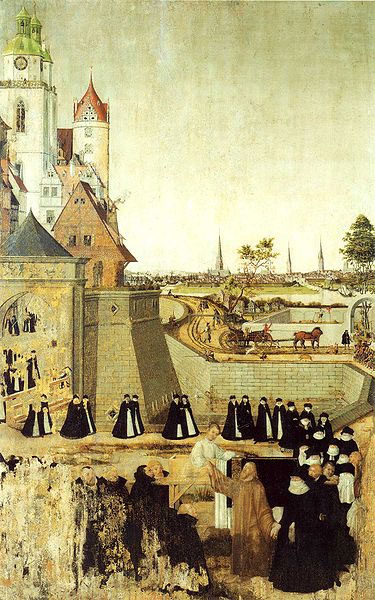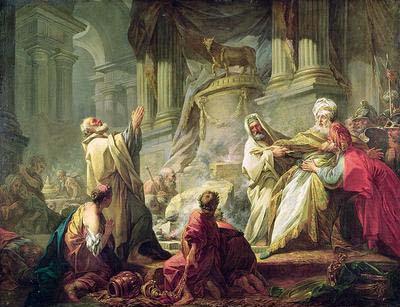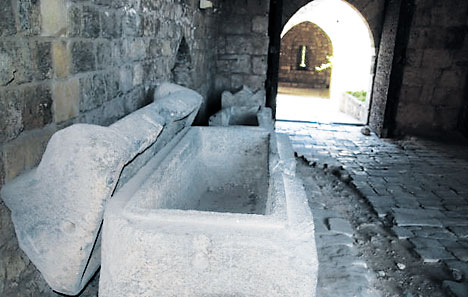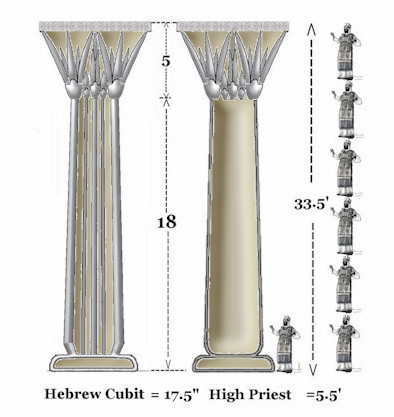Jun
21
2015

“Virtually every time in the Bible that God gives a promise or a kingdom to someone, the first thing he does is ruin the promise by sinning against God.”
A must-read essay by James B. Jordan | www.biblicalhorizons.com
Solomon began to build the Temple of the Lord in the fourth year of his reign, which was 480 years after Israel came out of Egypt, the year A.M. 2993 (1 Kings 6:1).
Seven years later, in the year A.M. 3000, the Temple building was finished (1 Kings 6:38). The many ornate pieces of furniture needed for the Temple were not yet made, however, and during the next thirteen years the palace of Solomon and his royal apartments were built, while the apparatus of the Temple worship was being created (1 Kings 7). Then, in A.M. 3013, both houses were finished (1 Kings 7:51; 9:10).
After Solomon dedicated the Temple and worship began to be conducted there, God appeared to Solomon. This was in the 24th year of his reign. God told him that if he remained faithful, the throne of David would be established over the kingdom of Israel perpetually. If Solomon sinned, however, the rule over Israel would be lost (1 Kings 9:1-9).
Continue reading
Comments Off | tags: Economics, James Jordan, Kings, Politics, Solomon | posted in Biblical Theology, Quotes
Jun
24
2013

or Who Is The Real Jericho?
Atheists love to embarrass Christians with a snide reference to the story of Elisha setting two bears upon some helpless children. What nobody, even Christians, seem to get is the “Covenant significance” of all the players in the story, harking back to Moses. The prophets were, after all, God’s “repo men.” [1]
[This post has been refined and included in Sweet Counsel: Essays to Brighten the Eyes.]
Continue reading
Comments Off | tags: AD70, Covenant curse, Covenant Theology, Egypt, Elisha, Feasts, Herod, Jericho, Jezebel, Kings, Leviticus, Peter Leithart, Pharaoh, Revelation | posted in Apologetics, Bible Matrix, Biblical Theology, The Last Days
Dec
18
2012

“They shall take up serpents…”
Thoughts on the Covenantal significance and serpentine nature of biblical “leprosy.”
[This post has been refined and included in Sweet Counsel: Essays to Brighten the Eyes.]
Continue reading
Comments Off | tags: Aaron, Acts, Baptism, Exodus, Kings, Leviticus, Miriam, Moses, Revelation | posted in Bible Matrix, Biblical Theology
Sep
4
2012
The Unexpected Luck of Widows’ Sons
A guest post by Luke Welch.

I’ve been reading The Hobbit again, out loud, to our children, and this time through, one phrase in the first chapter caught my attention.
Continue reading
Comments Off | tags: Crucifixion, Elijah, Isaiah, John, Kings, Luke, Luke Welch, Mary | posted in Bible Matrix, Biblical Theology, Quotes
May
25
2012
 “1-2 Kings gives us no such comfort: Christ has been divided in our divisions.”
“1-2 Kings gives us no such comfort: Christ has been divided in our divisions.”
Peter Leithart’s blog is included on the blogroll here, and most readers here read PJL anyway, but his recent posts on Church unity are worthy of flags being flown everywhere possible.
Continue reading
Comments Off | tags: Compromise, Jeroboam, Kings, Peter Leithart, Roman Catholicism, Ten Commandments | posted in Biblical Theology, Quotes
Dec
23
2011

or What’s the Problem with Matthew 27:51-53?
Continue reading
3 comments | tags: Apocalyptic, Atonement, Compromise, Elijah, Elisha, Kings, Literary Structure, Matthew, Resurrection, Revelation | posted in Bible Matrix, Biblical Theology, Ethics
Dec
6
2010

Peter Leithart writes:
“Why so much attention to the pillars of Solomon’s temple in 2 Kings 25? It is likely that these were the last major items left. Ahaz had already dismantled the bronze sea and the water chariots. King after king plundered the temple for bribe money. When Nebuchadnezzar came, not much was left. Perhaps even the ark was among the ‘gold’ items removed earlier.” [1]
Continue reading
Comments Off | tags: Creation Week, Daniel, Kings, Mordecai, Nebuchadnezzar, Peter Leithart, Solomon, Tabernacle, Temple | posted in Bible Matrix, Biblical Theology, Quotes, The Restoration Era
































